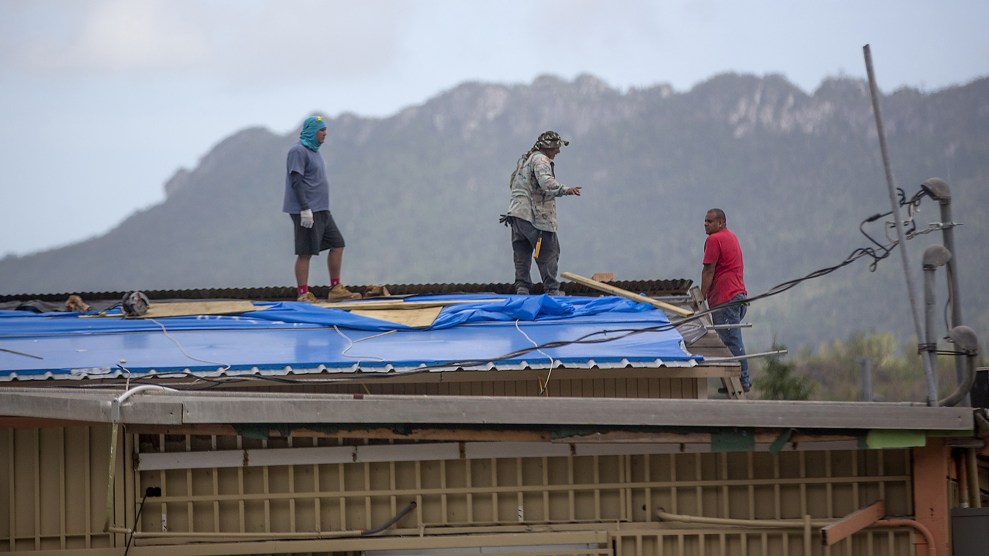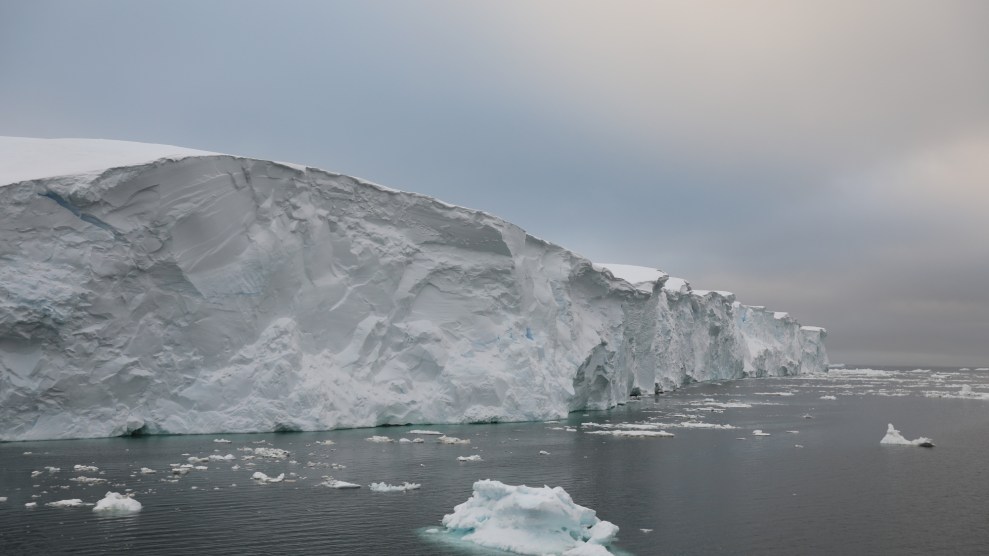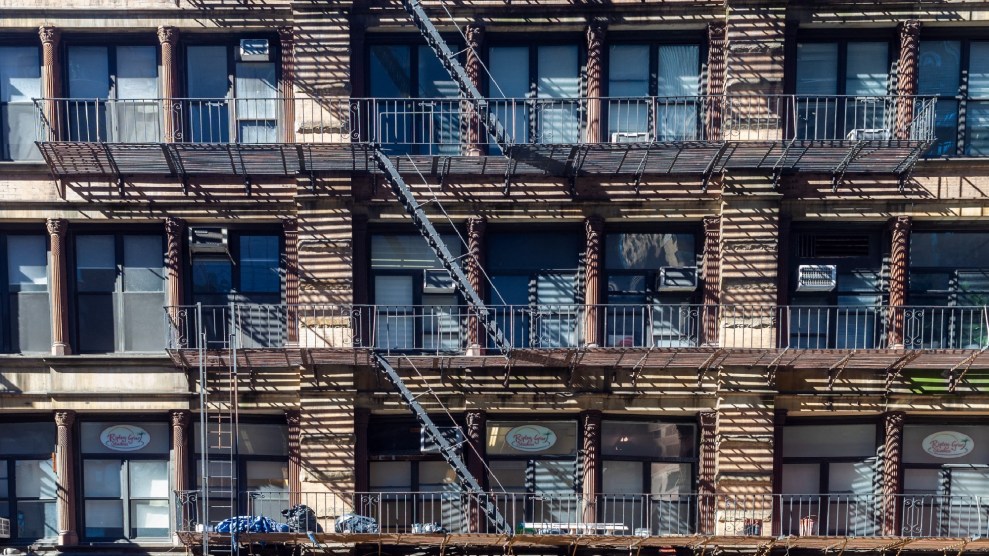
Workers fixing a rooftop destroyed by Hurricane Maria.Elizabeth Flores/ZUMA
This story was originally published by The Bulletin of Atomic Sciences and appears here as part of the Climate Desk collaboration.
In advance of the UN Climate Summit this month, the Global Commission on Adaptation, chaired by former UN Secretary-General Ban Ki Moon, Microsoft founder Bill Gates, and former World Bank chief (now IMF chief) Kristalina Georgieva, released its first-ever report. Chock full of recommendations, the report urges increased action to accelerate adaption to climate change impacts. The Commission calls for what it termed “three revolutions for a better future”: improved understanding of climate risk, better planning, and rapid mobilization of finance.
But one thing is missing: any mention of judicial action as a means to accelerate adaptation. Courts can act as a powerful accelerant to flame the adaptation revolutions—particularly in the United States, with its robust independent court system based on precedent. Legal judgments can sharply motivate government agencies, business leaders, and professionals to rethink how they do business. A finding of criminal or civil liability can spur laggards in adaptive behavior to move more quickly. And improvements in the science of attribution—which focuses on determining how human-caused climate change alters the probability and magnitude of weather events—will add to the body of evidence supporting liability determinations. Given the law’s power to drive adaptation, climate litigation has the potential to advance the Commission’s goal of jump-starting the necessary transitions for change.
Driving adaptation like a bulldozer.
Recent surveys have identified climate-related lawsuits in at least 28 countries, with more than three-quarters of those filed in the United States. Up to now, lawsuits brought against fossil fuel companies have grabbed the lion’s share of media attention. To date, 14 cities, counties, as well as the state of Rhode Island have sued the fossil fuel giants in US courts. They claim the companies created what the law terms a “nuisance” by allowing the emission of greenhouse gases when they knew about the detrimental impacts of climate change.
Another set of cases catching the limelight were brought by children against the US government. The children claim that, by pursuing policies such as permitting drilling on public lands, the federal government has contributed to climate change. Those policies have, according to the children, denied their constitutional right to a safe climate. All of these cases have primarily focused on stopping future harm from carbon emissions; legal experts, scholars, and commentators have engaged in lively debates as to whether the lawsuits will prove successful.
So far, none has.
But another line of attack has begun to emerge, one that could drive greater adaptation. In those cases, litigants seek relief for the harm caused by failing to prepare for climate change impacts such as extreme precipitation, bigger wildfires, sea level rise, deeper droughts, and more extreme heat. And if those cases establish liability, they have the potential to drive even greater adaptation.
To determine liability involves the concept of negligence and the duty of care—one of the first lessons a law student learns. The basic idea is fairly straightforward: To help drive responsible behavior, the law imposes a duty of reasonable care to avoid foreseeable harm when performing acts that could injure others. When this duty is neglected, the law can require compensation for the harm caused. If the person acted recklessly, prosecuting authorities may even decide to treat it as a criminal matter. Under the common law system of precedent, a legal determination in one case can have a profound impact on future cases: It can shape, or even bind, future court decisions. In this manner, not only does an adverse judgment cause the defendants in the particular lawsuit to change their behavior, it can also motivate others to change their behavior as well, so as to avoid future liability. Consequently, legal findings of liability have the potential to influence future decisions on matters ranging from proper construction standards and land use practices to the protection of natural resources—in other words, the very choices that build climate resilience.
Growing harm from climate-fueled extreme weather will in all likelihood cause people to turn with greater frequency to the judicial system to seek recompense. Improvements in science may increase the likelihood of legal success. As scientists and others deepen their understanding of the contributions of human-caused greenhouse gas emissions to worsening climate impacts and enhance their ability to predict future extremes, what judges and juries find constitutes “reasonable care” will adjust. So too may the determination as to whether the harm caused was “foreseeable.” In this manner, litigation over liability can help drive adaptation like a bulldozer.
The evolving duty of care.
The principle that, as circumstances change, so does the standard of care is well-established under the law. A decision by Judge Learned Hand, one of the most celebrated jurists in the history of the United States, illustrates the point.
In March 1928, two tug boats set off from Norfolk, Virginia. They towed barges filled with coal bound for New York. When they left port, the weather was fair with no hint of a storm. Neither tug boat, however, carried a radio to receive weather reports. The tugs pulled the barges northward along the coast without incident. But, as they passed Atlantic City, the wind began to pick up. Not long after, gale force winds started to blow, making the barges unwieldy, and eventually they sank. A lawsuit followed, alleging that the owners of the tugboats and barges had failed to exercise reasonable care. When the defendants appealed, Judge Hand concluded that they had not.
Finding the barge owners liable was easy: The barges were not seaworthy, leaked badly, and could not withstand a coastal March gale. But the tug owners were a different matter. Their liability turned on the failure to carry a radio on board the tugs. With radios, the tug boat captains would have received weather warnings, warnings that would have caused them to seek shelter from the storm. The tug boat owners claimed that they had no duty to provide such radios because they were not standard equipment in the industry. Judge Hand rejected the argument. He observed that typically what is commonly done is reasonable—but, in some cases, a whole industry may have lagged in making changes. He said that standard practice alone cannot decide the duty of care. In some instances, “there are precautions so imperative that even their universal disregard will not excuse their omission.” The principle that Judge Hand articulated close to a century ago may prove prescient for climate litigation.
As climate change impacts inflict more damage, governments, professionals, and business may find themselves liable for relying on historical standards of practice that fail to account for increasing risks.
A case in Chicago illustrates how this might unfold. Illinois Farmers Insurance Company filed a class-action lawsuit in 2014 on behalf of its policyholders after heavy rains led to wide-spread flooding. It sought damages from some 200 local agencies and municipalities, claiming that they had failed to take adequate precautions to manage storm water in the face of extreme precipitation from climate change. Illinois Farmers alleged that the defendants relied on obsolete rainfall frequency tables that did not reflect the increased risk. Although the company withdrew the case before it got to trial for reasons unrelated to the case’s merits, the legal action served as a warning shot of how widespread liability could be when alleging a breach of the duty of care to prepare for climate impacts. In the face of growing damage from new climate-driven extremes, future defendants could include not only the owners and operators of infrastructure, but also the contractors, sub-contractors, engineers, surveyors, architects, and anyone else a lawyer may think of.
Bottom line: Like the tug-boat owners, the argument that they followed standard practice may not prove an adequate defense.
Another emerging area of civil liability focuses on the duty of care owed by officers and directors to their companies and shareholders. In 2018, the insurance giant AIG predicted that directors and officers of a company may face liability for breaching the duty of care or failing to meet due diligence requirements if they fail to properly consider and disclose foreseeable climate risk. The consulting and accounting firm of EY published a report for its clients, warning of the risk of director liability for failing to consider climate risks. The report carried the provocative title, “Do you understand your duty of care and diligence when it comes to climate-related risks?”
And in August of this year, shareholders of Exxon Mobil Corp sued the officers and directors of the company claiming, among other things, that they had breached their fiduciary duty when they failed to accurately assess the risk that climate change posed to the company.
Further support for expanding officer and director liability came earlier this summer, when the Delaware Supreme Court—one of the most influential courts in the United States for corporate law—found that the directors of a company could be liable for failing to have in place a reasonable board-level system of monitoring and reporting risk. The decision spurred corporate lawyers to recommend that boards of directors review carefully their processes and procedures with regard to monitoring significant risks. Directors who fail to fulfill this duty may be found personally liable.
In addition to civil liability, some defendants could face criminal liability for failing to plan for climate risks. In Florida, inadequate backup power in the wake of Hurricane Irma in 2017 led to the filing of criminal charges in August 2019 when 12 patients died at a nursing home. At the conclusion of the most extensive criminal investigation ever conducted in Broward County’s history, prosecutors brought murder charges against four staff members of the Rehabilitation Center of Hollywood Hills nursing home. Extensive power outages had caused air conditioning to fail and temperatures to soar in the facility. Patients began to die in the oppressive heat; some had temperatures as high as 109.9 degrees. An administrative law judge recommended revoking the facility’s license, finding that because the nursing home lacked sufficient backup cooling capacity to deal with the loss of power, it had failed to provide a safe environment. He wrote in his opinion that “ultimately the patients were dependent on Hollywood Hills to recognize the danger and keep them safe.”
What’s attribution science got to do with liability?
One of the questions that arises in climate litigation is whether anthropogenic climate change contributed to the severity of particular events, events like extreme flooding in Houston or deeper droughts in California. The science of attribution can provide answers to these questions. The field has grown over the last several decades with climate scientists have conducting numerous studies to determine whether climate change contributed to various extreme events. For example, scientists have concluded that Hurricane Maria was almost five times more likely to happen in the climate of 2017 than in the climate of 1956. As the science improves, legal experts have opined that it may alter the duty of care by changing the foreseeability of future climate-exacerbated extremes. Attribution science could support a determination that a corporation, a professional, or a government agency breached their duty of care to avoid foreseeable harm. According to the Grantham Institute, litigants have already reportedly drawn on this science in cases against governments for failure to adapt or adequately prepare for extreme events.
Be a lawyer.
Courts can assist in creating the necessary revolutions envisioned by the Global Commission on Adaptation. Judicial findings of negligence have the potential to drive professionals, business leaders, and government agencies to make better decisions about preparing for climate risks. Adverse judgments can motivate them to consider more closely anticipated climate change impacts in their decision-making. Court dockets have already begun to bulge with cases seeking relief from harm caused by climate change. The use of climate change litigation as a tool to drive climate action will continue.
And, as the impacts accelerate, the advice of one climate expert may prove particularly apt: “If I were to advise my children about what career to go into related to climate change, I would say: ‘Be a lawyer.’ ”











